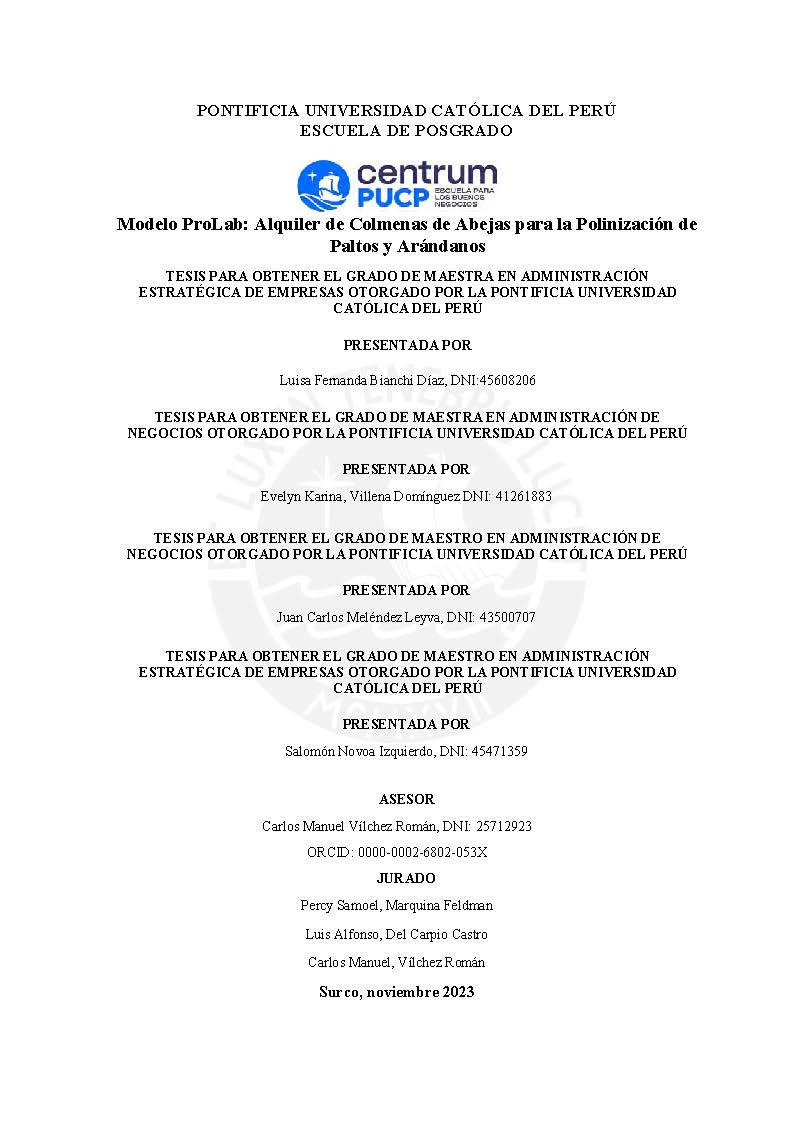| dc.contributor.advisor | Vílchez Román, Carlos Manuel | |
| dc.contributor.author | Bianchi Díaz, Luisa Fernanda | |
| dc.contributor.author | Villena Domínguez, Evelyn Karina | |
| dc.contributor.author | Meléndez Leyva, Juan Carlos | |
| dc.contributor.author | Novoa Izquierdo, Salomón | |
| dc.date.accessioned | 2024-03-27T16:09:07Z | |
| dc.date.available | 2024-03-27T16:09:07Z | |
| dc.date.created | 2023 | |
| dc.date.issued | 2024-03-27 | |
| dc.identifier.uri | http://hdl.handle.net/20.500.12404/27403 | |
| dc.description.abstract | El sector agroindustrial en el país viene creciendo de una manera vertiginosa, siendo sus
principales productos paltas y arándanos, de la misma manera aumenta la necesidad de
colmenas de abejas, vitales para lograr mejores rendimientos en estos cultivos. La superficie
cultivada de palta en el país es de 35,000 hectáreas y utilizan 10 colmenas por hectárea,
teniendo una necesidad de 35,0000 colmenas, lo cual asegura un rendimiento por encima del
30% en caso de no usar colmenas. Por su parte, el área cultivada de arándano en el país es
alrededor de 12,000 hectáreas, las cuales utilizan 48,000 colmenas en total. “En el caso del
arándano, 70% de la polinización depende de la abeja y el otro 30% depende de otros
insectos o de una pequeña autopolinización”. (red agrícola, 2020).
El Perú cuenta con la ley 26305 que declara de interés nacional la apicultura, de igual manera
existe el plan nacional de desarrollo apícola 2015 – 2025 liderado por el Ministerio de
Agricultura y Riego. Entonces, el desarrollo de la solución cuenta con un marco legal que
apoya la actividad apícola, es decir crear pymes que puedan incursionar en la apicultura
aumentando la disponibilidad de colmenas para la polinización en frutales.
El crear nuevas empresas apícolas se necesitará mano de obra para el desarrollo y crianza de
colmenas, compra de materiales, transporte, las empresas agroindustriales podrán aumentar
sus producciones y necesitarán más mano de obra para cosechar mayor cantidad de frutos
logrados por el efecto de la polinización. | es_ES |
| dc.description.abstract | The agroindustrial sector in the country has been growing at a dizzying pace, with avocado
and blueberries as its main products, and the need for beehives, which are vital to achieve
better yields in these crops, is also increasing. The cultivated area of avocado in the country
is 35,000 hectares and they use 10 beehives per hectare, having a need for 35,000 beehives,
which ensures a yield above 30% in case of not using beehives. On the other hand, the
cultivated area of blueberry in the country is around 12,000 hectares, which use 48,000 hives
in total. "In the case of blueberry, 70% of pollination depends on the bee and the other 30%
depends on other insects or small self-pollination." (agricultural network, 2020).
Peru has Law 26305 that declares beekeeping to be of national interest, and there is also a
national beekeeping development plan 2015 - 2025 led by the Ministry of Agriculture and
Irrigation. Therefore, the development of the solution has a legal framework that supports the
beekeeping activity, i.e. creating SMEs that can venture into beekeeping by increasing the
availability of hives for pollination in fruit trees.
The creation of new beekeeping companies will require labor for the development and
breeding of hives, purchase of materials, transportation, agro-industrial companies will be
able to increase their production and will need more labor to harvest more fruits achieved by
the effect of pollination. | es_ES |
| dc.language.iso | spa | es_ES |
| dc.publisher | Pontificia Universidad Católica del Perú | es_ES |
| dc.rights | info:eu-repo/semantics/openAccess | es_ES |
| dc.rights.uri | http://creativecommons.org/licenses/by-nc-nd/2.5/pe/ | * |
| dc.subject | Sector agroindustrial--Perú | es_ES |
| dc.subject | Apicultura--Producción--Perú | es_ES |
| dc.subject | Arándanos--Industria y comercio--Perú | es_ES |
| dc.subject | Palto--Industria y comercio--Perú | es_ES |
| dc.title | Modelo prolab: alquiler de colmenas de abejas para la polinización de paltos y arándanos | es_ES |
| dc.type | info:eu-repo/semantics/masterThesis | es_ES |
| thesis.degree.name | Maestro en Administración de Negocios | es_ES |
| thesis.degree.name | Maestro en Administración Estratégica de Empresas | es_ES |
| thesis.degree.level | Maestría | es_ES |
| thesis.degree.grantor | Pontificia Universidad Católica del Perú. CENTRUM | es_ES |
| thesis.degree.discipline | Administración de Negocios | es_ES |
| thesis.degree.discipline | Administración Estratégica de Empresas | es_ES |
| renati.advisor.dni | 25712923 | |
| renati.advisor.orcid | https://orcid.org/0000-0002-6802-053X | es_ES |
| renati.author.dni | 45608206 | |
| renati.author.dni | 41261883 | |
| renati.author.dni | 43500707 | |
| renati.author.dni | 45471359 | |
| renati.discipline | 413207 | es_ES |
| renati.juror | Marquina Feldman, Percy Samoel | es_ES |
| renati.juror | Del Carpio Castro, Luis Alfonso | es_ES |
| renati.juror | Vílchez Román, Carlos Manuel | es_ES |
| renati.level | https://purl.org/pe-repo/renati/level#maestro | es_ES |
| renati.type | https://purl.org/pe-repo/renati/type#tesis | es_ES |
| dc.publisher.country | PE | es_ES |
| dc.subject.ocde | https://purl.org/pe-repo/ocde/ford#5.02.04 | es_ES |







